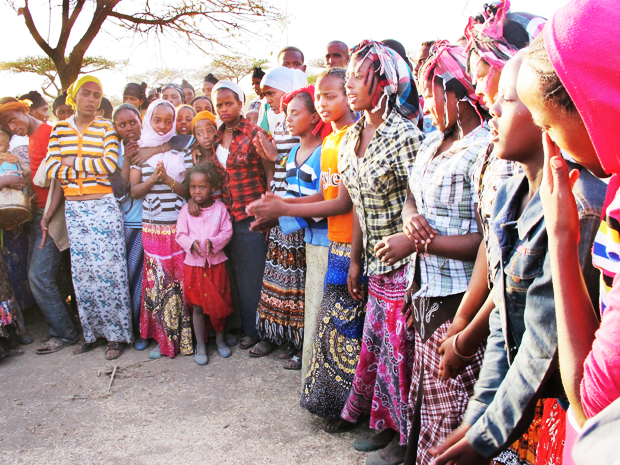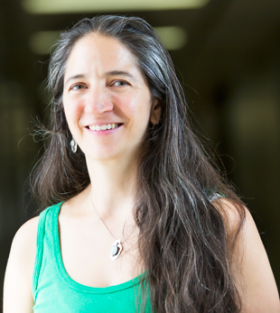She’s among 70 postdoctoral fellows who received the prestigious federal award this year, worth $70,000 per year for two years. The Banting Postdoctoral Fellowships aim to encourage and form top-tier researchers, both internationally and nationally.
An ethnomusicologist, Qashu received her PhD from Memorial University in Newfoundland. Her project, “Voices of Resistance to Marriage by Abduction: Arsi Oromo women’s expressive strategies for change in Ethiopia,” will expand on the extensive field research she conducted during her master’s and doctoral studies within Arsi Oromo communities.
The Arsi are a subgroup of the Oromo, a political minority but demographic majority in Ethiopia.
Field research in Ethiopia
UNESCO consultant, Trudeau doctoral scholar, teacher and viola player — Qashu’s CV is impressive. Mother to two toddlers, she recalls sitting at night with her three-week-old child on her lap, finishing up her Banting application.
“Without this award, it would have been very difficult to take care of my family and continue advancing my research,” she admits.
Her first contact with Arsi Oromo communities happened while she was pursuing her first master's degree at Université Paris 8. Several months of field research in rural Ethiopia led her to study the musical repertoires of Arsi weddings, and how they contribute to shaping group identities and values.
For her PhD dissertation, Qashu examined ateetee, a judicial process in which married women travel to their offenders' homes to sing insults and prayers, and negotiate until a resolution is reached and reconciliation is achieved. At the end of the ceremony, the offender must apologize and compensate the women with a cow.
Asked whether this is an effective way to apply restorative justice, Qashu answers unambiguously: yes. Through this community-construed process, the Arsi Oromo are able to provide women with a way to “protect, promote and claim their rights, and to resolve disputes peacefully in a rapidly changing environment,” she says.
Collaborative filmmaking
During her postdoctoral research at Concordia, Qashu will be focusing more specifically on the strategies younger generations of Arsi women have to claim their rights and voice the challenges they face, especially when confronted with traumatic experiences such as marriage by abduction.
Qashu's multidisciplinary interests — ethnography, community activism, music, storytelling, filmmaking and other expressive arts — will all be addressed through her project.
Her research will take the form of a documentary film, to be produced in collaboration with the Arsi Oromo community. She plans on showing women how to use the camera to document their own stories.
Listening to the community
“I’ve always been interested in understanding other people’s backgrounds, how they perceive the world,” Qashu says. “On a global scale, we tend to overlook that some of the processes already in place, some of the local ways of doing things, are extremely effective.”
She will be working with her supervisor Ronald Rudin, a professor in Concordia’s Department of History and co-director of the Centre for Oral History and Digital Storytelling (COHDS).
“Qashu’s research is a perfect fit with the sort of projects pursued at COHDS,” says Rudin. “As an interdisciplinary research unit dedicated to exploring the remembered past through digital and oral approaches, COHDS specializes in projects such as Qashu’s, which are community-based and oriented towards listening to the voices of those who have had difficulty in making themselves heard.”
What type of legacy does she envision for her postdoctoral research? “I would like for young people to create something that they can keep up within the community, be it through the making of videos or the maintenance of a Facebook group. And maybe even create jobs out of it.”
Although the Oromo people are the largest ethnic group in Ethiopia, they are a political minority. Qashu hopes her work will help raise awareness of their struggle against marginalization and help them to assert their culture and identity, both locally and internationally.
Leila Qashu delivered the keynote address at Concordia's Centre for Oral History and Digital Storytelling Annual General Assembly on September 23, 2016. Learn more about the Centre.
 Banting postdoctoral fellow Leila Qashu: “I’ve always been interested in understanding other people’s backgrounds, how they perceive the world.” | Photo courtesy of Leila Qashu
Banting postdoctoral fellow Leila Qashu: “I’ve always been interested in understanding other people’s backgrounds, how they perceive the world.” | Photo courtesy of Leila Qashu
 Leila Qashu | Photo by Concordia University
Leila Qashu | Photo by Concordia University


